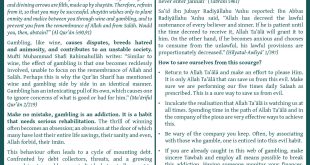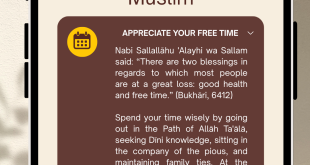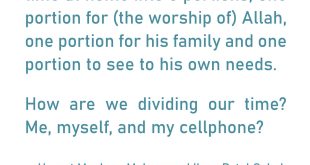(0 Messenger, tell your wives and your daughters and believing women that they should draw down their shawls over themselves – 33:59)
Tragically, the systematic oppression of Muslims in India continues unabated. From the demolishing of Masājid and an alarming increase in anti-Muslim sentiment, Muslims continuously face new challenges. The latest trial is in the form of a court ruling in Karnataka which erroneously determined the headscarf as a cultural practice that has no basis in Islām. By electing to pass judgment on the issue of Hijāb in Islām, the non-muslim secular court has overstepped its bounds. Rulings on Islām are given by Muslim theologians (Muftīn) and not by non-Muslim courts.
Islām: A Way of Life
Islām is a unique way of life. Together with ‘Ibādāt (acts of worship), Islām also governs how we live our lives. In the Qur’ān and Ahādīth, the principles of an Islāmic dress code are prescribed. The salient features of this dress code are simplicity and modesty. This forms a part of Islām and cannot be isolated and termed as cultural. When Nabī Sallāllahu ‘Alayhi wa Sallam reprimanded the Persian envoys over their short beards and long moustaches, he demonstrated the fact that Islām does not pay heed to culture. Every practice approved by Nabī Sallāllahu ‘Alayhi wa Sallam forms a part of Islām.
History of Hijāb
Free-mixing of men and women was frowned upon since the time of our father, Sayyidunā Ādam ‘Alayhis Salām.
The Qur’ān Karīm highlights the incident of the arrival of Sayyidunā Mūsā ‘Alayhis Salām in Madyan where he noticed two females standing aside, waiting for their turn to give water to their animals. Instead of intermingling with the men, they would wait for them to clear the path before leading their animals to drink.
Before the revelation of the verses obligating Hijāb, concealing themselves from men was a trait found in the honourable women of Arabia. A narration in Jāmi’ Tirmidhī explains how the mother of the believers, Sayyidah Zainub bint Jahsh Radhiyallāhu ‘anhā sat in her home in the presence of some visitors. The narration says: “and she sat with her face turned towards the wall”. [Tirmidhī, 3218]
The Niqāb (face-veil) in Islām
There is no difference of opinion between the scholars of all four schools of jurisprudence on the fact that a woman is obligated to cover her face in front of strange men. The overpowering presence of Fitnah (immorality in society) is clear. Even during the best of times, the Sahābiyyāt (female companions of Nabī Sallāllahu ‘Alayhi wa Sallam) would ensure they maintained the Niqāb (face-veil). Sayyidah Āyesha Radhiyallāhu ‘anhā narrates the incident of the farewell Hajj of Rasūlullāh Sallāllahu ‘Alayhi wa Sallam. Whenever a group of people would pass by the chaste wives of Rasūlullāh Sallāllahu ‘Alayhi wa Sallam, they would cover their faces using their jilbābs (outer garments) (to ensure that no male would see their faces). (Abu Dawūd, 1833)
The Headscarf in Islām
There is no doubt that covering the hair is mandatory for a Muslim woman. The fact that a woman must cover her hair in Salāh, regardless of whether anyone can see her or not, indicates its importance. The hair forms a part of the ‘Awrah of a woman and she is required to cover it in the presence of men and non-muslim women.
Being grateful for the bounties of Allāh Ta’ālā before they are snatched away
In South Africa, a Muslim woman is free to dress Islāmically. The Niqāb (face-veil) and headscarf are not only allowed but are regarded as symbols of dignity. This is a great favour of Allāh Ta’ālā. The genuine appreciation of this bounty is by ensuring that we adhere to the commands of donning the face-veil and headscarf as required by Sharī’ah. When the non-Muslim courts rule against the headscarf, we are rightfully enraged. However, the absence of the face-veil and headscarf in our homes and families does not bring about a similar reaction.
Is it not strange that the same women who religiously wear the face mask for fear of a virus cannot take the courage to wear the Niqāb and Hijāb out of the fear of Allāh Ta’ālā?
A thought-provoking incident
A Sahābī, Sayyidunā Khallād Radhiyallāhu ‘anhu was martyred during the time of Nabī Sallāllahu ‘Alayhi wa sallam. His mother, Ummu Khallād Radhiyallāhu ‘anhā, clad in her full Niqāb, came to Nabī Sallāllahu ‘Alayhi wa Sallam to ask regarding the status of her martyred son in the hereafter. One of those present commented: “You have come to ask about your son (who has been martyred) and have taken so much care in ensuring you are covered in your Niqāb (even at such a moment)!” She replied: “I may have lost my son, but I have not lost my modesty!” (Abu Dawud, 2488)
Subhānallāh!
May Allāh Ta’ālā ease the difficulties of the Muslims throughout the world and grant us all the freedom to practice upon all the commands of Islām without any check or hindrance. Āmīn
28 Sha’bān 1443 / 31 March 2022 A0031
A0031 - Hijab, An Integral Part of Islam (1)To download the PDF, click here:
 Wifāq ul Ulāma (SA) ASSOCIATION OF SOUTH AFRICAN 'ULAMA
Wifāq ul Ulāma (SA) ASSOCIATION OF SOUTH AFRICAN 'ULAMA



